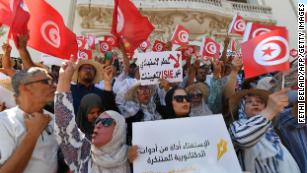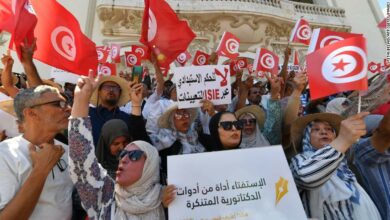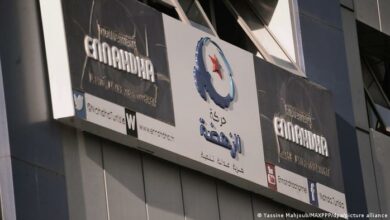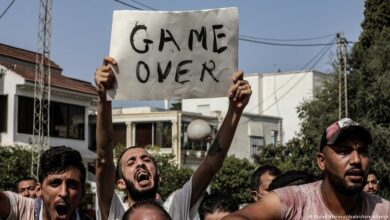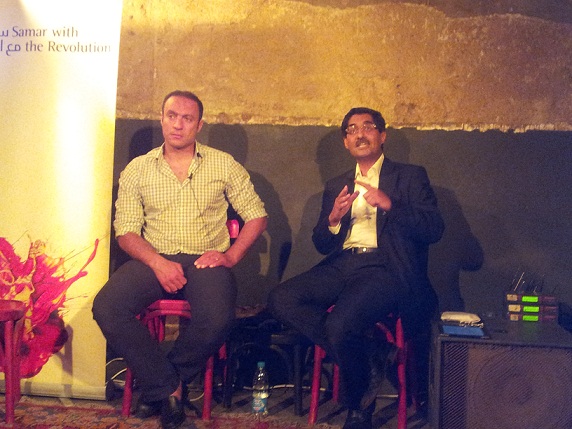
A Bahraini doctor, a female Yemeni writer and an Egyptian football player were sitting on a stage last week to tell their stories about the revolutions.
Hosted by the Spring Festival, organized by the Culture Resource in collaboration with the Cultural Cooperative Association for Youth in Theatre and Cinema and other cultural entities, the three activists — Nabil Tammam, Arwa Othman and Nader al-Sayed — shared their testimonies at the Egyptian Center for Culture and Art, Makan, in a night dubbed “Samar and the Revolution.”
Samar is the Arabic word for gathering for an intimate nightly chat. And it is in this space that stories about the revolution are told and retold.
While some stories of the revolution have been broadcast in every possible way, the testimonies in this event revealed what could have been missed by cameras. If they did one thing, the stories reminded that the details and depth of personal experiences are of paramount relevance to the documentation of our revolutionary times.
“I was driving back from my aunt’s funeral [she died the night before the protests broke out]. I saw another funeral, of a martyr. He was the first martyr. I found myself walking with the mourners, leaving my car in the street. I then felt I should be at a hospital, helping out the injured,” said Tammam, the Bahraini medic.
His story must resonate with any doctor anywhere.
“I couldn’t stand it when I woke up one day to witness a massacre, hundreds of wounded and killed people, after the first attack on the protesters. I can’t forget how atrocious their injuries were — it would only happen in a war,” he recalled.
Tammam headed a volunteer medical team around the Pearl Roundabout sit-in, which became the geographical symbol of the Bahraini uprising that kicked off in March 2011 to challenge the widely perceived stability of the Gulf.
Despite the security services giving orders to the doctors to evacuate the hospital, Tammam and his staff refused to leave.
After four days of siege on the hospital, they were arrested, blindfolded, handcuffed and then tortured while being interrogated by Bahraini police.
Tammam remembered that he was once honored by King Hamad bin Isa al-Khalifa for his efforts to rescue wounded Palestinians during the Israeli war in 2009, as he was sent there on a humanitarian mission. After this mission, Tammam was diagnosed with lymph node cancer, apparently due to phosphorus attacks. It is because of this cancer that, three years later, Tammam was released from the jail he was taken to for his complicity in Bahrain’s nascent revolution.
Upon his release, he found he had been fired from his job for his political involvement.
Arwa Othman, the Yemeni columnist and writer, said her story with the revolution started with a camera.
“I was photographing young people in the morning dancing and singing for freedom, then at night I photographed their dead bodies after they got killed,” she said.
“It’s a story of a stolen revolution; when those young people died, they were hoping for a new life for their county — a life of freedom, a state of law and a fair living for their families, but what happened next was that political parties stole the revolution, reducing its aims to the toppling of [former President] Ali Abdullah Saleh, instead of the whole regime,” Othman said.
Accusing Islamists of being opportunistic, Othman recounted how they reduced Change Square in Sanaa to a single voice, their own voice.
“They even imposed their laws on the square; they separated men and women,” she added.
“After a while, they made prisons in the square to incarcerate those who violated their rules,” Othman said. “What freedom did they come for?”
The revolution, she explained, turned into a bid between the state’s army and the Islamists over who has, and can afford, the highest number of martyrs.
“I hope that they close the squares to stop this bloodshed,” Arwa said.
Sayed, the famous football player, was the optimistic voice of the evening.
He said that the revolution was inside him a long time ago; he dreamed that the people might stand in the streets like they did when he and his team came back to Egypt in 1998 having triumphed in the Africa Cup of Nations.
“There were huge celebrations waiting for us; people were everywhere in the streets. I asked myself when they would come down to the streets for their own rights and needs,” he added.
Sayed said the Egyptian revolution has garnered achievements that everyone is forgetting amid all the negativities.
“It’s normal that the most organized groups win the first elections, but nothing will stay except for real revolutionary groups, because people went out seeking change, and they won’t accept keeping everything the way it was,” he said.
The three stories moved the memories of the audience members; everyone started telling their own story. The evening was a reminder of the power of the personal account, and of how it engages and activates collective memories.

